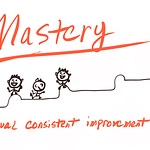Expanded and revised for my next great adventure
Before diving in, feel free to check out On Unautomatability, version 1.0 here [no longer hosted! Available upon request.]
Notes for version 1.1
After spending a year in higher education where I got to head a technology entrepreneurship program, I tend to agree that the word "entrepreneur" and its variants are essentially not helpful for people who want to know what they need to do. In the spirit of being action-oriented, it's been cut.
Also, over the past year I've come to appreciate the importance of beauty, whether in music, computer code, product design, painting, whatever. It's important and it plays a role in the future.
Moreover, I learned a lot from launching a cohort-based course for 3D printing; namely, that the way I was going about it was far too top down, rooted in my own expertise (rather than customer needs and problems), and overall far too "if you build it, they will come." In the end, it was a beautiful disaster.
Then, the opportunity opened up for me to move to Silicon Valley after more than a decade and a half in the Midwest raising a family while growing up myself. As a result of this and other life circumstances, I decided to shut down Unautomatable U.
However, the path to unautomatable me is never-ending, and that's where this blog is headed for now. I'll align customer needs, pains, and problems with my passion for teaching one of these days soon, but that day is not today.
So, version 1.1. represents my freshest ideas on the concepts of unautomatability and on those who will be unautomatable in the 21st century; namely, meta-makers.
Welcome to the next leg of my journey.
Definitions
unautomatable: not able to be programmed into a machine, (of a person) consistently intentional, creative, unique, pioneering, and disciplined in their use and leverage of current technological tools
meta-makers: fearless builders of hardware, software, and community who have cultivated the superpowers of thinking, speaking, and writing and are capable of aligning utility with beauty to create value for themselves and others
Assertions
To stay employed in the 21st century, we all must cultivate our powers to think, speak, and write creatively, while constantly learning to leverage the latest technological tools.
Meta-makers will go further; they will be net creators despite their consumption, generating net value for society. The best among them will be the entrepreneurs of tomorrow.
Although meta-makers will be the only individuals who are truly unautomatable in the 21st century, there is no clear path to becoming a meta-maker today.
We all must begin charting our own paths as net creators - and thus value generators - early in life. Degrees and certifications, large bureaucracies (a.k.a. the original AI systems), hoarding existing wealth, or generally seeking comfort and security will not help us keep pace with the demands of the unautomatable workforce of tomorrow.
In the 21st century, we all need to be more like David Goggins ♂️, less like Scrooge McDuck , and aware that getting stuck in the middle will leave us running as fast as we can just to stay in the same place.
Who am I to say this s**t?
I've spent the last 20 years trying to outrun automation, and the last 10 years trying to help university students and others to do so as well. Over that time, I've seen hardware and software eat the world in turn. In short, everything technological that I once held dear has walked the path from research, to development, to commercialization, to iteration, optimization, and ultimately, to commoditization and obscurity.
This is my story.
In the early 2000's, I learned two-dimensional (2D) mechanical design with pencils and T-squares, and loved it. AutoCAD (i.e., automatic computer-aided design) came next, which although 2D, now required everyone to use software as a precursor to creating mechanical hardware. By 2009, after some stints in "customer service" (i.e., Arby's, Donatos, Rally's) and "manufacturing and logistics" (i.e., bagging ice and then delivering it), I was regularly creating "marketing drawings" for proposed systems at an environmental monitoring startup (see below). I eventually would even team up with a graphic artist to color them and to make them even more beautiful. Alas, then came SolidWorks, making 3D the new standard. Once rendering became a snap, my super great skillset that required two humans, was officially rendered obsolete.
Strike one.
In 2009 I also began working to set up a manufacturing and quality department for the same company (it was a small outfit and I was working ~35 hours/week). The company manufactured and sold data loggers and integrated sensors of different types that measured weather and water quality through their software. That was back when saying "data logger" actually meant something to people. Today, our watches and smartphones turn our bodies into data loggers, and then the platformed communities that we engage with aggregate our collective data at scale, providing likely competitive advantages in AI strategy...but I digress and jump ahead. In the end, connecting environmental monitoring sensors to terminal strips and "talking" to them in order to "log" data was a great experience for me.
While I learned important lessons at the time, including a basic understanding of electro-mechanical systems, the difficulties of separating the data "wheat from the chaff," and the difference between collection of data and prediction with information, my job at that time was literally to "idiot-proof" the process of building these data logging systems, testing them, and packaging and shipping them to customers. Again, this meant both software (e.g., PowerPoint presentations demonstrating the right way to do things step-by-step, bills of materials for each product maintained in the database instead of physical cards, etc.) and hardware (e.g., manufacturing fixtures (check me out below!), test processing equipment, etc.).
You see, the only way for us to increase our throughput (a word that I would learn much later) was to build systems that made us more "lean," so that we could ship more products per unit time and hire "less skilled" (i.e., cheaper) interns to help us do it. Pretty soon, the systems were set up and I had worked myself out of that job as well; at least, 80% of the value had been extracted for 20% of my full-time effort over 6-9 months or so.
So, creating value meant working yourself out of a job?
It seemed so, which sounded in any case like it aligned with ancient wisdom.
Strike two.
From 2011 to 2015 I was in school, still. At first this was because it aligned well with my personal family life at the time, but also because I still thought that school really mattered.
I learned later that it's not school that matters, it's learning.
The long and the short of this little stint in R&D is this: I spent 4 years researching how to use software (computer simulations) to intelligently inform hardware (microscopes) and software (image processing algorithms) to look at other hardware (pieces of material). The point, in the end, was to save time (and money) for the lab by solving the problem of too many researchers coming to lab managers and asking for too much time on their super-expensive equipment. It was sort of a success, but not one that was end-to-end. Such is academic life.
In a nutshell I had worked with a team that was looking to enable data collection (ahh, data again), to streamline the processing of that data, and to create a way to inform further data collection in real time (scientists like to call this sort of thing a "feedback loop," a term that we'll use from here on out). They wanted to do all of this faster than was currently possible, and eventually, they wanted to automate this process to take humans completely out of this (feedback) loop. I certainly didn't get there, but hopefully laid some breadcrumbs for some unautomatables of the future to finish the job.
Strike three? Well, in the game of life we're never out unless we're down and out. So we're dropping the baseball analogy and heading onward and upward with the story!
From 2014 to 2017, 3D printing was essentially the focus of my work. In particular, I was obsessed with optimizing the process of zapping metal materials with lasers to create lava that then solidified super fast. We wanted to create strong parts for planes and spaceships. We even decided to put cameras and fancy sensors on the laser zaps to collect - you guessed it - more data! Why? Because, if you can get collection, processing, prediction, and feedback loops right, you can automate the process!
Hmm...a pattern seems to be emerging.
From 2017 to 2020 I was intensely focused on (learning about) machine learning, deep learning, and artificial intelligence. So I did what has become my de-facto modus operandi; namely, to read all the books I could that google told me to. Both before and after I developed my own perspective on the superintelligent AI (another never-ending process, as many of you readers may well know), I started doing a lot of "ML/AI" projects after I got some really smart people to tell me what the hell ML, DL, and AI actually were, and to show me what sort of models these tools could produce with the 3D printing data that I had been looking at. A whole new world of possibilities blossomed, but in the end I guess it was still the same old rigmarole. These new "systems that learn" were simply formalized processes for collecting data, putting it in formation, creating models that could predict the future based on the past, and then setting up feedback loops to keep doing this, automatically, eventually with no humans.
So where does this all lead us to?
Over the past couple of years, what has become infinitely more clear to me is that even if you're not that worried about robots running around taking your job just yet, all you have to do is to consider the world of software inside your phone and computer, where there are already way more robots than there are humans. Each of these robots has already automated a function that used to be done by a human, just like the way that AutoCAD automated the process of drawing straight lines with a T-square and pencil.
So what's the sharp point on this?
In the time it has taken me learn all of these things, I've gotten all of the degrees that I possibly could get and spent many tens of thousands of dollars "educating" myself (which, brutal truth-to-be-told, eventually still needs to be paid back). I've taken all of the most recent and up-to-date courses in technology. I've done my best to shapeshift with what the world and my own life needed.
The final result: I'm still helplessly behind on the latest tools and technologies in nearly every dimension of reality.
So don't be like me, and don't be like Alice in Wonderland running as fast as you can just to stay in the same place.
There's is a better way.
Be you.
I know that sounds cheesy but embrace being human and learn about yourself and others. Learn the black arts of persuasion and taking care of yourself properly; learn about your psychology and your physiology. Learn first principles and the timeless lessons of humans through the ages. Learn how to make things beautiful, including your relationships with yourself, your family, your community, and the world.
If you think I just turned on a dime, stick with me! It's coming together soon.
The path to the epiphany, or the road to unautomatability
So what should you do, then, exactly? This is supposed to be action-oriented in the end, right?
Well, based on my own personal journey, which I look forward to elaborating much more in the coming months and years, I believe that it can all be broken down into a few critical steps. For me, all of my qualitative and quantitative data and my own feedback loops have led me to three steps, although I know of others who might say four, two, or even just one step. But there's something magical about threes, right?
Step 1: Explore
Explore until you find something worth focusing on. Keep trying things and figuring out what doesn't work for you until you stumble upon something that does.
Step 2: Focus
Once you stumble upon something that is at the intersection of what you personally and uniquely suited to do and that the world also needs, focus in on that one thing. If the scope of the work is too much to get started, reduce the damn scope of work. Get started.
Step 3: Create
Finally, create something, and aim at creating it for others. Aim at making things better and creating something that's good. Create it in a minimal way so that you can show it to them and get - drumroll please - feedback. Because you're a learning machine too, the most amazing one that's ever been created.
Keep iterating on these steps, and search for happiness in the process (like Goggins). Make this your operating system (like Scott Adams). Forget Alice or Scrooge, because once you actually have money, you'll incorporate it into your system. In other words, you'll actually know what to do with it.
You'll understand how to be a net value generator, rooted in your why (like Simon Sinek).
You'll be an invincible meta-maker.
You'll be unautomatable.
Conclusion
The world has always evolved faster and cheaper than you have, and will continue to, at scale. Carve out your own little slice of paradise by doing what humans do best: pushing yourself so that you get stronger. The future is going to be a hell of a lot harder to get around in than it was in the past, or than it is today. So buckle up, strap yourself in, and get ready to enjoy the ride. I hope that engaging with my content delivers some much needed fuel to all of you friends out there.
PS ... my personal journey continues
I've always aimed at creating real value, and I'd like to think that I've had some success so far, however limited, at least with a handful of people and products. Everyone and everything that I've helped has evolved far beyond the point of me helping the way I did back then. But that's OK, that's life in the 21st century.
My meandering path over the last two decades has spanned customer service, logistics, manufacturing, mechanical design, quality assurance, technical sales and marketing, research, consulting, product development, hardware and software, and much teaching and learning. Most importantly IMHO, however, I've learned a lot about myself, especially psychologically and physiologically, and I have picked up what I hope is a decent foundation on which to understand and build lasting relationships with others.
Of all of the successful people that I've ever met or gotten to know personally, none of them remember anything except relationships in the end.
Bringing this post to a close, I'm also happy to report that after spending my early adult years growing up myself while raising a beautiful daughter in the Midwest, my path has finally led me all the way to Silicon Valley. I've always dreamed of making it here. Now that I'm here, I realize that what I need to do is to follow my own advice and go back to the basics.
I'll keep reading and learning, teaching and listening, thinking and debating, but I'm going to focus on the everyday as much as the larger questions about society and life itself. I'm going to leave room for the feedback loops to unfold in the short term and in the decades to come starting with the feedback loop represented by this very post. The one that led me back to prioritizing net creation.
Look for more from me coming soon, as I'll be heading back to Step 1 shortly. I look forward to continuing my own journey towards value creation and unautomatability, starting with myself and my next post, and then working outward.
Cheers,
Greg


















On Unautomatability, Expanded and Revised